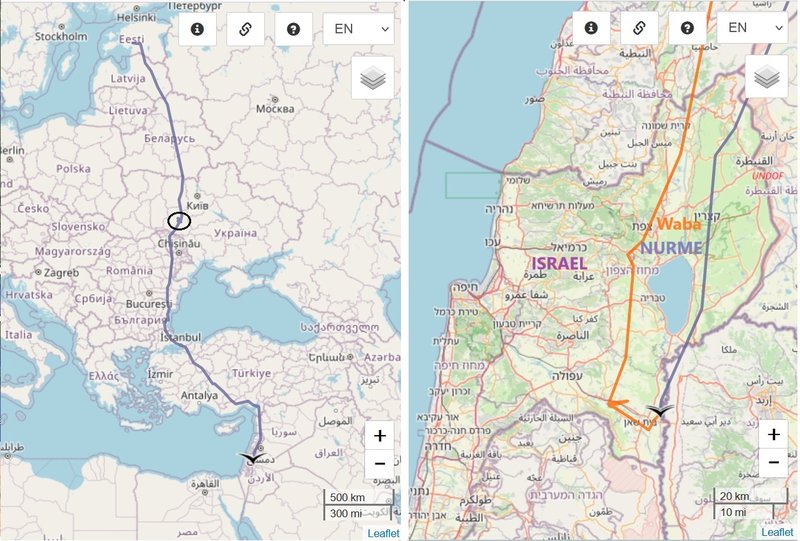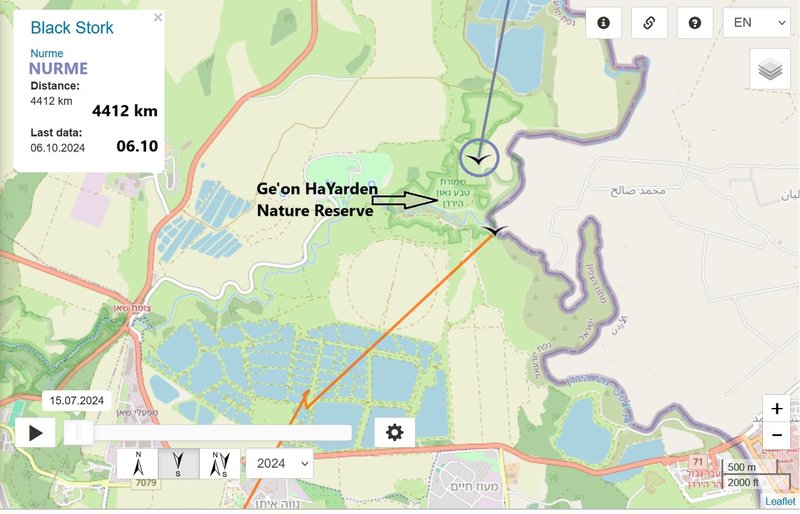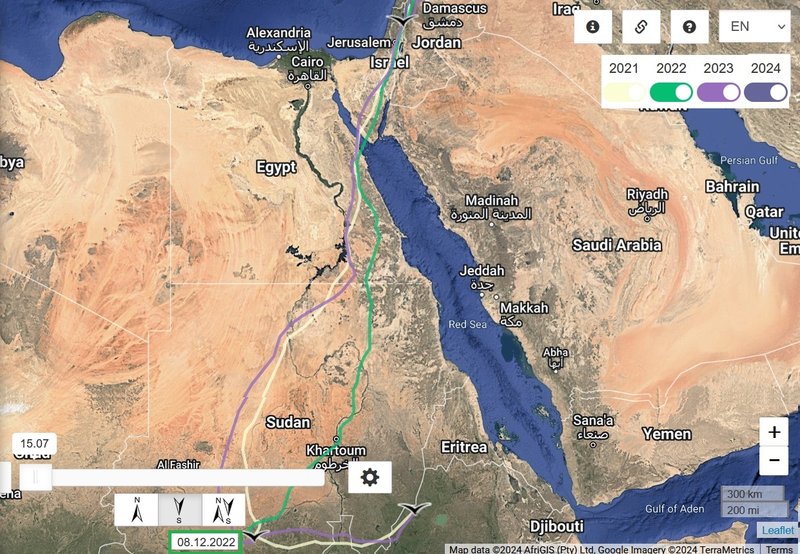October 07
NO new data for Nurme
October 08
NO new data for Nurme
Last data https://www.ciconianigra.sk/viewtopic.p ... 180#p40180
travelling day
- 06.10.2024, Distance: 4412 km (+ 582 km in 2 days)
- ISRAEL: to the north from the Beit She'an Valley
-----
if there is new information, we will of course publish it here
Nurme (adult male, Rapla county)
-
marika.solo
- Site Admin
- Posts: 19926
- Joined: 29 Sep 2021, 09:38
-
marika.solo
- Site Admin
- Posts: 19926
- Joined: 29 Sep 2021, 09:38
Re: Nurme (adult male, Rapla county)
OVERVIEW

2023/2024 (!):
- last update on 02.10.2023, JORDAN: Salikhat w Hajijah - a town in Al-Āghwār ash-Shamāliyah district of Karak governorate
- next update ornitrack data 21.03.2024 Egypt, Sinay (thx to Madli); spring birdmap 26.03, Turkey

previous winterings


2023/2024 (!):
- last update on 02.10.2023, JORDAN: Salikhat w Hajijah - a town in Al-Āghwār ash-Shamāliyah district of Karak governorate
- next update ornitrack data 21.03.2024 Egypt, Sinay (thx to Madli); spring birdmap 26.03, Turkey

previous winterings

-
marika.solo
- Site Admin
- Posts: 19926
- Joined: 29 Sep 2021, 09:38
Re: Nurme (adult male, Rapla county)
new but old news about Nurme
https://www.facebook.com/padekimeErelia ... 6C3TmW6mEl
03.02.2023
Gerų naujienų? O jeigu dar romantiškų artėjant Valentino dienai?
Žinoma, gerų naujienų niekad nebūna per daug, o tokių - išvis retai pasitaiko. Atkeliavo jos iš Estijos, kur kameros praeitą vasarą užfiksavo gražią tarptautinę porelę - estų juodąjį gandrą, vardu Nurme, ir mūsų lietuvišką gandriukę. Kol kas vadinam tiesiog mažybiniu "gandriuke", nes ši (kaip dabar paaiškėjo) patelė dar nėra pilnai subrendęs paukštis, žieduota ji 2020 m. Biržų rajone kartu su Daiva Ir Darius Norkūnai. Praėjusią vasarą ši porelė neturėjo dėties (nepaisant "romantiškų jausmų puoselėjimo").
Šis stebėjimas reikšmingas ir apskritai žinių apie juoduosius gandrus prasme, nes tai pirmas žieduoto juodojo gandro, išaugusio Lietuvoje, aptikimas Estijoje (~ 300 km nuo žiedavimo vietos). Iki šiol žinota tik 10% Lietuvoje išaugusių gandrų, kurie įsikūrę 300 km ir toliau.
Belieka tikėtis ir linkėti, kad abu paukščiai sėkmingai peržiemotų ir galbūt šiemet vėl susitikę tame pačiame lizde Estijoje sukurtų naują tvirtą juodųjų gandrų šeimą, padėsiančią stabdyti besitęsiantį šios rūšies nykimą Baltijos šalyse.
Už nuotraukas ir informaciją ačiū kolegoms U. Sellis ir R. Nellis.
Good news? And what about romantic ones for Valentine's Day?
Of course, there can never be too much good news, and such news is rare. It came from Estonia, where last summer cameras captured a beautiful international couple - an Estonian Black Stork named Nurme and our Lithuanian Stork. For now we just call it "stork", because this (as it turned out) female is not yet a fully mature bird, she was ringed in 2020 in Biržai district together with Daiva and Darius Norkūnai. Last summer this couple did not have "a romance" (despite "romantic feelings").
This observation is also significant in terms of knowledge about black storks in general, because this is the first record of a ringed black stork that grew up in Lithuania, in Estonia (~ 300 km from the ringing site). So far, only 10% of the storks that have grown up in Lithuania are known to be located 300 km and further away.
We can only hope and wish that both birds will successfully overwinter and perhaps meet again this year in the same nest in Estonia and create a new strong family of black storks, which will help stop the continuing decline of this species in the Baltic States.
Thanks to colleagues U. Sellis and R. Nellis for the photos and information.
photo 1 (already in our forum thx to Madli - shared with me on 23.02.2023 via email) here: https://www.ciconianigra.sk/viewtopic.php?p=8434#p8434 )
https://www.facebook.com/photo/?fbid=56 ... 6455398651
photo 2
https://www.facebook.com/photo?fbid=567 ... 6455398651
additional info about this female:
"a bird in its 3rd calendar year of life - V702, which was read in February 2022 over Struma by Greek ornithologist Kostas Papadopoulos. Now it turns out that it is a young female ringed in June 2020 as a chick in northern Lithuania by Darius Norkūnas. Interestingly, in the spring of 2022 she flew almost 300 km further from her place of origin in N to central Estonia, where she intended to start her first breeding in her life with a male Nurme with ring 7153 with a backpack logger (which is why we know that this male winters in Sudan). There, a camera trap set up by Estonian stork researcher Renno Nellis documented a breeding attempt."
(https://www.facebook.com/BocianiMy/post ... iGydajHYZl)
in our forum already here https://www.ciconianigra.sk/viewtopic.p ... 878#p38878
https://www.facebook.com/padekimeErelia ... 6C3TmW6mEl
03.02.2023
Gerų naujienų? O jeigu dar romantiškų artėjant Valentino dienai?
Žinoma, gerų naujienų niekad nebūna per daug, o tokių - išvis retai pasitaiko. Atkeliavo jos iš Estijos, kur kameros praeitą vasarą užfiksavo gražią tarptautinę porelę - estų juodąjį gandrą, vardu Nurme, ir mūsų lietuvišką gandriukę. Kol kas vadinam tiesiog mažybiniu "gandriuke", nes ši (kaip dabar paaiškėjo) patelė dar nėra pilnai subrendęs paukštis, žieduota ji 2020 m. Biržų rajone kartu su Daiva Ir Darius Norkūnai. Praėjusią vasarą ši porelė neturėjo dėties (nepaisant "romantiškų jausmų puoselėjimo").
Šis stebėjimas reikšmingas ir apskritai žinių apie juoduosius gandrus prasme, nes tai pirmas žieduoto juodojo gandro, išaugusio Lietuvoje, aptikimas Estijoje (~ 300 km nuo žiedavimo vietos). Iki šiol žinota tik 10% Lietuvoje išaugusių gandrų, kurie įsikūrę 300 km ir toliau.
Belieka tikėtis ir linkėti, kad abu paukščiai sėkmingai peržiemotų ir galbūt šiemet vėl susitikę tame pačiame lizde Estijoje sukurtų naują tvirtą juodųjų gandrų šeimą, padėsiančią stabdyti besitęsiantį šios rūšies nykimą Baltijos šalyse.
Už nuotraukas ir informaciją ačiū kolegoms U. Sellis ir R. Nellis.
Good news? And what about romantic ones for Valentine's Day?
Of course, there can never be too much good news, and such news is rare. It came from Estonia, where last summer cameras captured a beautiful international couple - an Estonian Black Stork named Nurme and our Lithuanian Stork. For now we just call it "stork", because this (as it turned out) female is not yet a fully mature bird, she was ringed in 2020 in Biržai district together with Daiva and Darius Norkūnai. Last summer this couple did not have "a romance" (despite "romantic feelings").
This observation is also significant in terms of knowledge about black storks in general, because this is the first record of a ringed black stork that grew up in Lithuania, in Estonia (~ 300 km from the ringing site). So far, only 10% of the storks that have grown up in Lithuania are known to be located 300 km and further away.
We can only hope and wish that both birds will successfully overwinter and perhaps meet again this year in the same nest in Estonia and create a new strong family of black storks, which will help stop the continuing decline of this species in the Baltic States.
Thanks to colleagues U. Sellis and R. Nellis for the photos and information.
photo 1 (already in our forum thx to Madli - shared with me on 23.02.2023 via email) here: https://www.ciconianigra.sk/viewtopic.php?p=8434#p8434 )
https://www.facebook.com/photo/?fbid=56 ... 6455398651
photo 2
https://www.facebook.com/photo?fbid=567 ... 6455398651
additional info about this female:
"a bird in its 3rd calendar year of life - V702, which was read in February 2022 over Struma by Greek ornithologist Kostas Papadopoulos. Now it turns out that it is a young female ringed in June 2020 as a chick in northern Lithuania by Darius Norkūnas. Interestingly, in the spring of 2022 she flew almost 300 km further from her place of origin in N to central Estonia, where she intended to start her first breeding in her life with a male Nurme with ring 7153 with a backpack logger (which is why we know that this male winters in Sudan). There, a camera trap set up by Estonian stork researcher Renno Nellis documented a breeding attempt."
(https://www.facebook.com/BocianiMy/post ... iGydajHYZl)
in our forum already here https://www.ciconianigra.sk/viewtopic.p ... 878#p38878
-
marika.solo
- Site Admin
- Posts: 19926
- Joined: 29 Sep 2021, 09:38
-
marika.solo
- Site Admin
- Posts: 19926
- Joined: 29 Sep 2021, 09:38
Re: Nurme (adult male, Rapla county)
continuation - Spring migration 2025 - https://www.ciconianigra.sk/viewtopic.php?f=147&t=253